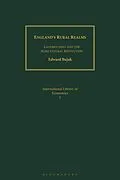The English countryside in the nineteenth century experienced the shifting power struggle from the great landed estates towards democratisation. Challenging received scholarship that the landed estates declined in power and patronage, Bujak places the Victorian globalisation of trade alongside the democratisation of the English countryside. By doing so, he reveals that the economic decline of the great landed estates was balanced by their continued social and political influence in the countryside up to the Great War. With its focus on Suffolk, a county at the forefront of agricultural improvement and thus hardest hit by the agricultural depression, the patterns revealed by "England's Rural Realm" demonstrates the durability of the great estate system across the English countryside.
Autorentext
Edward Bujak is Associate Professor of Modern British History at Harlaxton College, UK. He is a Senior Fellow of the Higher Education Academy, and a Fellow of the Royal Historical Society, and the Royal Society of Arts.
Inhalt
Table of Contents
Introduction
1.The Great Victorian Estates & Their Owners
2.Agriculture & the Great Estates, 1837-1901
3.The Landed Interest & the Land Question
4.Landowners & the 'Lock Out'
5.Landowners and Local Government
6.The Landowner and the Tenant- Farmer
7.Debt, Country Seats and Country Pursuits
8.The Great Estates Before the Great War
Conclusion
